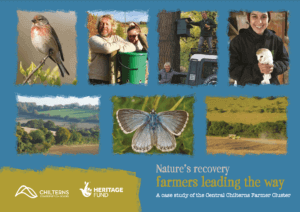
CASE STUDY: Ivinghoe Aston Farm, traditional orchard
Ivinghoe Aston Farm is using a Farming in Protected Landscapes grant to restore and expand a neglected traditional orchard, with benefits for the landscape, wildlife, climate change and local people.
Overview
Ivinghoe Aston Farm is a mixed farm located on the boundary of the Chilterns AONB. The farm used to have an operational orchard but it became neglected in the early twentieth century.
This Farming in Protected Landscapes project is enabling the orchard to be restored and expanded to create an active yet traditional orchard with benefits for the landscape, the farm, wildlife, climate change and local people.
A Farming in Protected Landscapes grant of £32,557 was approved, with the total project costing £41,452.

Objectives
The objectives of the project are to:
- Maintain and enhance biodiversity: a traditional orchard provides the habitat of the trees themselves but also the low-input grassland surrounding the trees. The orchard at Ivinghoe Aston Farm will be grazed by sheep and cattle to help botanical diversity develop. Providing new and enhanced habitat with good connectivity is an important objective for the project.
- Sequester carbon: as the trees reach maturity, they will sequester carbon at a conservative rate of 10 tonnes an acre per year totalling 140.4 tonnes per year.
- Benefit people: The farm will work with Mid Shires Orchard Group to host training courses and events. In addition, local people will be involved with planting the new orchard areas.
- Conserve a sense of place: The Ivinghoe and Cheddington area was very important for orchards and fruit production in the late 1800s and early 1900s. This project contributes to conserving and enhancing the quality and character of the landscape in the area at the same time as allowing the farm to diversify. In the long term, the orchard will allow the farm to establish a small scale and local fruit and juicing operation.

A traditional orchard showing old and new trees at Ivinghoe Aston
Actions
- Planting of 353 new fruit trees (200 apple, 17 hazel, 34 quince, 34 gage, 34 plum, 34 pear).
- Installation of tree guards.
- Botanical survey and monitoring.
- Sward diversification using yellow rattle seed (if appropriate).
Outcomes
The first phase of the project (winter 2021/22) is on track, with 103 trees having been planted and the accompanying tree guards installed as well.

Keys to success
The enthusiasm and hard work of Neil Ashby (farmer) has ensured the project has got off to a successful start. In addition, the application was well supported by the FiPL assessment panel.
“I believe fundamentally that land uses like traditional orchards are needed both for enriching the environment and bringing participation of the rural community. I also deeply believe that these orchards and other conservation efforts don’t have to compete with or infringe modern agriculture, but can in fact augment and improve it. I’m very thankful for the support of the Chiltern Conservation Board, as this has given me the chance to make a real tangible difference to the local environment. I’m eagerly anticipating sharing this project as the trees grow and establish.”
Neil Ashby, farmer.

Need more information?
 Have you got an idea for a project you’d like to apply for funding for?
Have you got an idea for a project you’d like to apply for funding for?
If so, complete the enquiry form, email farming@chilterns.org.uk or call 01844 355500 and we’ll guide you through the application process.




